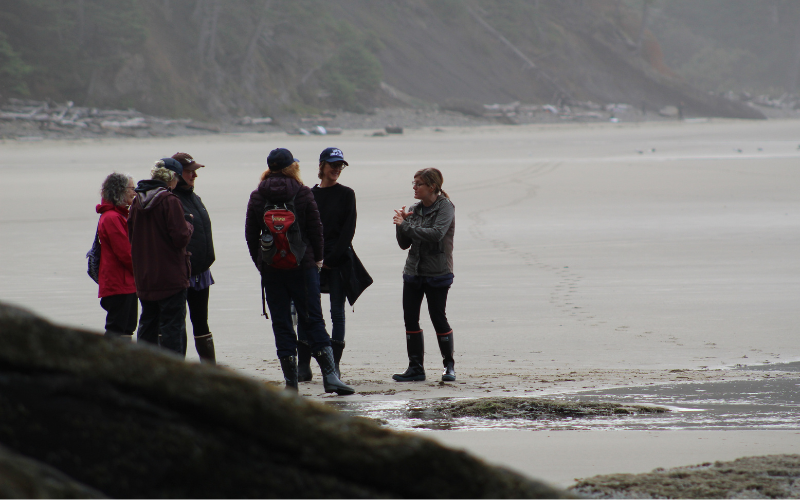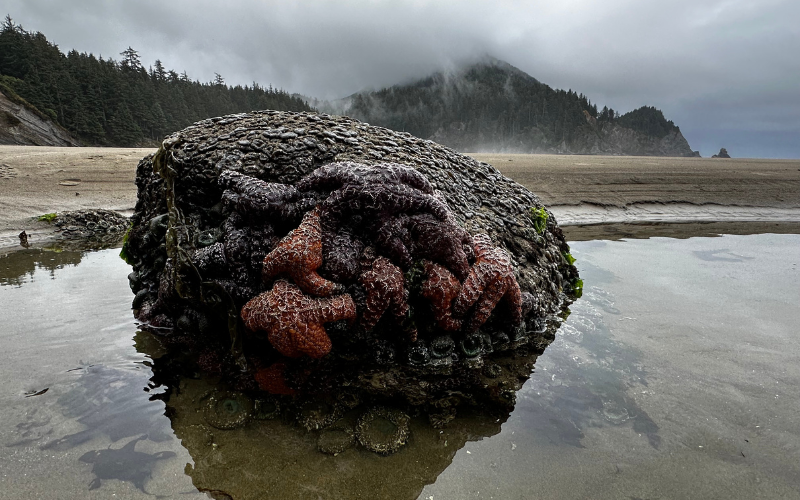
The 2023 TAP Season kicked off in June and finished at the end of September.
The 2023 season of the Tidepool Ambassador Program (TAP) at Cape Falcon Marine Reserve came to a close Sept. 30.
TAP—introduced in 2021 as a joint effort among a few of Oregon’s Marine Reserves—is all about education and connecting beach-goers with the marine environment and wildlife. North Coast Land Conservancy’s program was led this year by TAP Coordinator Jolene Magee and TAP Guide Jet Ideue. Nine volunteers also were pivotal ambassadors throughout the summer, starting June 3.
From June to September, TAP leaders and volunteers were at the beach a total of 25 shifts, representing more than 80 hours. They interacted with approximately 1,350 visitors at Short Sand Beach, adjacent to Cape Falcon Marine Reserve.
The ambassadors occasionally stationed themselves at both the north and south ends of the beach. However, because of the terrain at Short Sand Beach this summer, a deep trench at the south end limited access to the tidepools. As a result, they were not visited as frequently.
Jolene says she always tried to schedule at least one volunteer to join her and Jet on the beach, so they could split up if they needed to. Or if one person had to step away, no one was left alone. On a few days, there were four or five volunteers out there.
“All the volunteers were really fantastic this year and really essential,” Jolene says.

TAP leaders and volunteers channel their favorite marine animal.
Promoting Tidepool Etiquette
During their shifts, ambassadors tracked how many visitors they interacted with, along with the etiquette-issues they encountered and unique marine wildlife observations. Some of the issues included trampling; dogs being off leash; people harassing and collecting wildlife; and drone usage in the marine reserve. All of these can negatively affect the sensitive ecosystem and its vast array of marine life.
The primary challenge they faced this summer was people trampling on the rocks—which is a common problem in most rocky intertidal zones. While some violators seemed to demonstrate a sense of entitlement—or the attitude that they have been visiting this beach for so long and have “the right” to walk where they want—Jolene and Jet feel most people simply aren’t aware of the amount of marine life on the rocks.
“A lot of people just truly didn’t know that they were stepping on things that were alive,” Jolene says. That includes at least two type of anemone, aggregating and giant green; thatched and gooseneck barnacles; sea stars; limpets; snails; nudibranchs; and crabs, to name a few. “Any time you step on those rocks, those are the species you are likely going to be stepping on.”
The tidepool ambassadors don’t have authority to enforce rules, as Oregon Department of Fish & Wildlife (ODFW) manages Cape Falcon Marine Reserve and the Oregon Parks and Recreation Department (OPRD) manages the ocean shore along the reserve.
Instead, the ambassadors focus on informing, educating, motivating, and inspiring.
“When it comes to any natural resource that’s easily accessible but also so sensitive, I think there’s always value in having interpreters out there,” Jolene says. “Education is never bad. You can never have too much education. … It was always really fun to just sit down in front of a well-coated rock and be like, ‘Here are all the things on here that are alive.’”
And while Jet and Jolene were educating visitors and beach-goers about the tidepools, the marine reserve, and marine wildlife, they also were learning.
“There never fails to be a person that asks a question that you don’t know the answer to,” Jolene says. “And you’re going to have to go look it up and learn about it.”
Jet echoed that sentiment.
“I learned something every day,” she says.

The tidepools at Short Sand Beach are part of the Cape Falcon Marine Reserve.
Making a Difference
According to Jet, one challenge this summer was recognizing she doesn’t have the power or influence to change everyone’s behavior or perception.
“That was a great obstacle for me to understand and accept,” she says. But on the flip side, being able to educate or inspire some individuals adds up over time. “It made me recognize even the smallest amount of work we do is really important.”
She recalls one day in early August when they experienced the lowest tide of the season. It seemed to bring a heightened sense of excitement and interest among volunteers and visitors alike, with people sharing their knowledge and actively engaging with their surrounding environment in a positive way.
“The energy and everyone was awesome,” Jet says, adding it was “one of the many times I felt like I could see the differences I’m making. It reaffirmed the importance of the work we do and the social responsibility we have to protect one another, no matter the species.”
One of Jolene’s favorite memories of the season was Fourth of July, when the ambassadors got to interact with a large group of extended family members who stopped at the beach while traveling along the coast.
“They were so nice and so funny and engaged and enthralled,” she says. “It was a really great day with them.”
However, when she and Jet returned to the parking lot, she saw her car had a flat tire. Cell service is also notoriously bad in the area. She was trying to figure out what to do, when the family came walking back up from the beach.
They postponed their lunch plans so a few of their group could help change the flat tire. Jolene recalls one of them sayings something along the lines of, “You teach us about jellyfish; we’ll teach you how to change a tire.”
“It made a bad situation much better,” she says.
On another day, she had just set up the telescope on the beach, when a gray whale popped into view. A volunteer saw the back end of the whale emerge from the water, confirming the sighting.
In general, Jolene says, the whole season was fun. “We didn’t have any bad days out there.”
(The 2023 Tidepool Ambassador Program is supported, in part, by a grant funded by Transient Lodging Tax dollars through Tillamook Coast Visitors Association.)
Comments